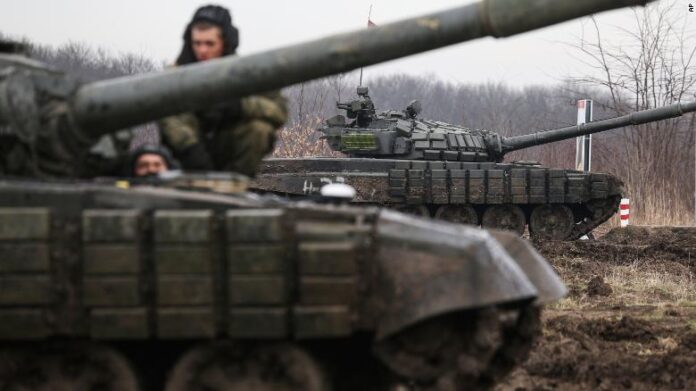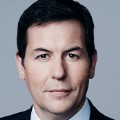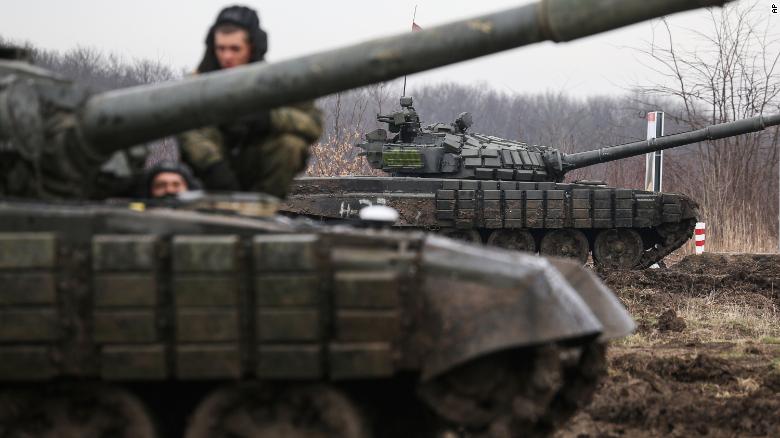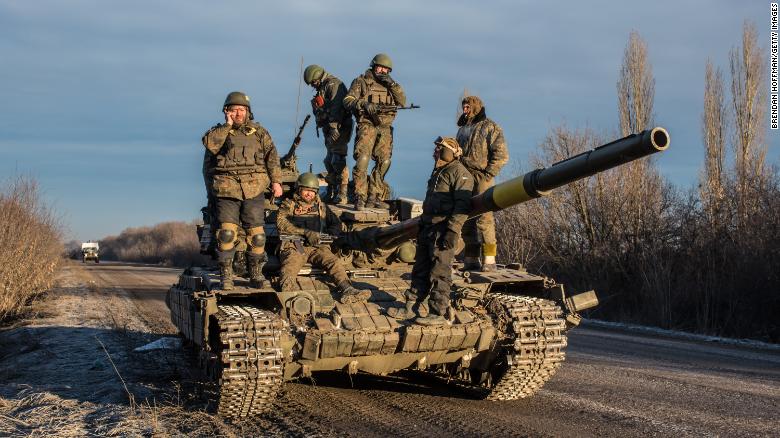Kyiv, Ukraine (CNN)Tensions between Ukraine and Russia are at their highest in years, with a Russian troop build-up near the two nations’ borders spurring fears that Moscow could launch an invasion.
- Advertisement -
Ukraine has warned that Russia is trying to destabilize the country ahead of any planned military invasion. Western powers have repeatedly warned Russia against further aggressive moves against Ukraine.
The Kremlin denies it is planning to attack and argues that NATO support for Ukraine — including increased weapons supplies and military training — constitutes a growing threat on Russia’s western flank.
The picture is complicated — but here’s a breakdown of what we know.
The United States and NATO have described the movements and concentrations of troops in and around Ukraine as “unusual.”
As many as 100,000 Russian troops have remained amassed at the Ukrainian border, despite warnings from US President Joe Biden and European leaders of serious consequences should Putin move ahead with an invasion. And US intelligence findings in December estimated that Russia could begin a military offensive in Ukraine “as soon as early 2022.”
Speaking alongside his Ukrainian counterpart in Kyiv on January 19, US Secretary of State Antony Blinken said Russia had “ratcheted up its threats and amassed nearly 100,000 forces on Ukraine’s border, which it could double on relatively short order.”
In late 2021, satellite photos revealed Russian hardware — including self-propelled guns, battle tanks and infantry fighting vehicles — on the move at a training ground roughly 186 miles (300 km) from the border.
The Ukrainian Defense Ministry’s latest intelligence assessment says Russia has now deployed more than 127,000 troops near Ukraine, including some 21,000 air and sea personnel, transferred more Iskander operational-tactical missiles to the border, and increased its intelligence activity against the country.
The assessment came after three rounds of diplomatic talks between Russia and the West aimed at de-escalating the crisis failed to produce a resolution.
US officials have said a Russian invasion of Ukraine could happen at any point in the next month or two.
Many of Russia’s military bases are to the west of the vast country — the direction from which history suggests any threats are most likely to come. Russia’s Defense Ministry has said it is conducting “regular” winter military drills in its southern region, parts of which border Ukraine.
Meanwhile, Ukraine’s eastern Donetsk and Luhansk regions bordering Russia, an area known as Donbas, have been under the control of Russian-backed separatists since 2014. Russian forces are also present in the area, referred to by Ukraine as “temporarily occupied territories,” although Russia denies it.
The front lines of the conflict have barely moved in five years, but there are frequent small-scale clashes and sniper attacks. Russia was angered when Ukrainian forces deployed a Turkish-made combat drone for the first time in October to strike a position held by the pro-Russian separatists.
Russia also has forces numbering in the tens of thousands at its massive naval base in Crimea, the Ukrainian territory it annexed in 2014. The Crimean peninsula, which lies to the south of the rest of Ukraine, is now connected by a road bridge to mainland Russia.
Tensions between Ukraine and Russia, both former Soviet states, escalated in late 2013 over a landmark political and trade deal with the European Union. After the pro-Russian then-President, Viktor Yanukovych, suspended the talks — reportedly under pressure from Moscow — weeks of protests in Kyiv erupted into violence.
Then, in March 2014, Russia annexed Crimea, an autonomous peninsula in southern Ukraine with strong Russian loyalties, on the pretext that it was defending its interests and those of Russian-speaking citizens. First, thousands of Russian-speaking troops, dubbed “little green men” and later acknowledged by Moscow to be Russian soldiers, poured into the Crimean peninsula. Within days, Russia completed its annexation in a referendum that was slammed by Ukraine and most of the world as illegitimate.
Shortly afterwards, pro-Russian separatists in Ukraine’s Donetsk and Luhansk regions declared their independence from Kyiv, prompting months of heavy fighting. Despite Kyiv and Moscow signing a peace deal in Minsk in 2015, brokered by France and Germany, there have been repeated ceasefire violations.
According to UN figures, there have been more than 3,000 conflict-related civilian deaths in eastern Ukraine since March 2014.
The European Union and US have imposed a series of measures in response to Russia’s actions in Crimea and eastern Ukraine, including economic sanctions targeting individuals, entities and specific sectors of the Russian economy.
The Kremlin accuses Ukraine of stirring up tensions in the country’s east and of violating the Minsk ceasefire agreement.
The Kremlin has repeatedly denied that Russia plans on invading Ukraine, insisting Russia does not pose a threat to anyone and that the country moving troops across its own territory should not be cause for alarm.
Moscow sees the growing support for Ukraine from NATO — in terms of weaponry, training and personnel — as a threat to its own security. It has also accused Ukraine of boosting its own troop numbers in preparation for an attempt to retake the Donbas region, an allegation Ukraine has denied.
Russian President Vladimir Putin has called for specific legal agreements that would rule out any further NATO expansion eastwards towards Russia’s borders, saying the West has not lived up to its previous verbal assurances.
Putin has also said that NATO deploying sophisticated weapons in Ukraine, such as missile systems, would be crossing a “red line” for Russia, amid concern in Moscow that Ukraine is being increasingly armed by NATO powers.
Kremlin spokesman Dmitry Peskov said in November that weapons and military advisers were already being supplied to Ukraine by the US and other NATO member states. “And all this, of course, leads to a further aggravation of the situation on the border line,” he said.
If the US and its NATO allies do not change course in Ukraine, Russian Foreign Minister Sergey Lavrov has warned that Moscow has the “right to choose ways to ensure its legitimate security interests.”
Ukraine’s government insists that Moscow cannot prevent Kyiv from building closer ties with NATO if it chooses.
“Russia cannot stop Ukraine from getting closer with NATO and has no right to have any say in relevant discussions,” the Foreign Ministry said in a statement to CNN, in response to Russian calls for NATO to halt its eastward expansion.
“Any Russian proposals to discuss with NATO or the US any so-called guarantees that the Alliance would not expand to the East are illegitimate,” it added.
Ukraine insists Russia is seeking to destabilize the country with the country’s president, Volodymyr Zelensky, recently saying a coup plot, involving Ukrainians and Russians, had been uncovered.
Ukrainian Foreign Minister Dmytro Kuleba warned that a planned coup could be part of Russia’s plan ahead of a military invasion. “External military pressure goes hand in hand with domestic destabilization of the country,” he said.
Tensions between the two countries have been exacerbated by a deepening Ukrainian energy crisis that Kyiv believes Moscow has purposefully provoked.
At the same time, Zelensky’s government faces challenges on many fronts. The government’s popularity has stagnated amid multiple domestic political challenges, including a recent third wave of Covid-19 infections and a struggling economy.
Many people are also unhappy that the government hasn’t yet delivered on benefits it promised and ended the conflict in the country’s east. Anti-government protests have taken place in Kyiv.
In a January 19 video address, Zelensky urged the Ukrainian people to “calm down” amid mounting unease over a possible Russian invasion. “We are aware of everything, we are ready for everything,” he said, before adding that he “sincerely believes” this year “will pass without a war” with Russia.
Kuleba also sought to reassure Ukrainians who fear the US, its NATO allies and Russia could leave Kyiv out of discussions. “No decisions about Ukraine without Ukraine is a principle that we adhere to,” he said.
NATO Secretary General Jens Stoltenberg has said “there will be a high price to pay for Russia” if it once again invades Ukraine, a NATO partner.
“We have a wide range of options: economic sanctions, financial sanctions, political restrictions,” said Stoltenberg, in a December 1 interview with CNN.
After Russia invaded Ukraine in 2014, NATO increased its defenses “with combat-ready battlegroups in the eastern part of the alliance, in the Baltic countries, in Latvia … but also in the Black Sea region,” Stoltenberg said.
Ukraine is not a NATO member, and therefore doesn’t have the same security guarantees as NATO members.
But Stoltenberg left the possibility of Ukraine becoming a NATO member on the table, saying that Russia does not have the right to tell Ukraine that it cannot pursue NATO membership.
High-stakes talks between Russia and NATO in Brussels in mid-January were “not an easy discussion,” according to Stoltenberg, who added that “differences will not be easy to bridge.” However, NATO allies and Russia “expressed the need to resume dialogue,” he said.
President Joe Biden told Zelensky earlier this month in a phone call that the US and its allies “will respond decisively if Russia further invades Ukraine.”
But Biden appeared to undermine that message when he subsequently suggested during a White House news conference that a “minor incursion” by Russia would elicit a lesser response than a full-scale invasion of the country.
While Biden vowed harsh economic consequences on Russia should Putin send his troops over the border, including restricting its financial transitions in US dollars, he suggested Western nations were not in sync on what to do should a lesser violation occur. “There are differences in NATO as to what countries are willing to do, depending on what happens,” he said.
His remarks prompted a swift White House clarification. “President Biden has been clear with the Russian President: If any Russian military forces move across the Ukrainian border, that’s a renewed invasion, and it will be met with a swift, severe, and united response from the United States and our Allies,” press secretary Jen Psaki wrote in a statement.
One Ukrainian official told CNN he was “shocked that the US President Biden would distinguish between incursion and invasion” and suggest that a minor incursion would not trigger sanctions. “This gives the green light to Putin to enter Ukraine at his pleasure,” the official added.
The diplomatic kerfuffle came as Blinken prepared for further talks with European allies on the Ukraine-Russia crisis and to meet with his Russian counterpart Sergey Lavrov. Blinken has previously warned Russia that “any renewed aggression can trigger serious consequences.”
Two defense officials told CNN on January 3 that the Defense Department has developed military options for Biden if he decides to increase capabilities in eastern Europe to further deter potential Russian aggression against Ukraine. Both officials emphasized that this part of routine planning the military does and that for now, the focus remains on diplomacy and potential economic sanctions.
US Deputy Secretary of State Wendy Sherman and Russian Deputy Foreign Minister Sergey Ryabkov held meetings in Geneva on January 10, as the US sought to de-escalate the threat of a Russian advance.
The US delivered roughly $450 million in security assistance to Ukraine in 2021, the Pentagon said, including a package of small arms and ammunition in December. The Biden administration is now weighing new options, including providing more arms to Ukraine to resist a Russian occupation, a senior US official told CNN.
The Obama administration was taken by surprise when Russia invaded Crimea in 2014 and backed an insurgency in eastern Ukraine’s Donbas region. US officials say they are determined not to be caught out by another Russian military operation.
“Our concern is that Russia may make a serious mistake of attempting to rehash what it undertook back in 2014, when it amassed forces along the border, crossed into sovereign Ukrainian territory and did so claiming falsely that it was provoked,” Blinken said late last year.
Unrest in the former Soviet state of Kazakhstan was unwelcome news for Putin at the beginning of 2022.
Deadly protests in early January saw the Kazakh government resign, a state of emergency be declared and troops from a Russia-led military alliance deployed to help contain the unrest.
But experts have warned that Russia’s intervention is unlikely to be the end of the story. Blinken said that “once Russians are in your house, sometimes it is very difficult to get them to leave.”
Another issue revolves around energy supply. Ukraine views the controversial Nord Stream 2 pipeline — connecting Russian gas supplies directly to Germany — as a threat to its own security.
Nord Stream 2 is one of two pipelines that Russia has laid underwater in the Baltic Sea in addition to its traditional land-based pipeline network that runs through eastern Europe, including Ukraine.
Kyiv views the pipelines across Ukraine as an element of protection against an invasion by Russia, since any military action could potentially disrupt the vital flow of gas to Europe.
Analysts and US lawmakers have raised concerns that Nord Stream 2 will increase European dependence on Russian gas and could allow Moscow to selectively target countries such as Ukraine with energy cut-offs, without broader disruption to European supplies. Bypassing eastern European countries also means those nations would be deprived of lucrative transit fees Russia would otherwise pay.
In May 2021, the Biden administration waived sanctions on the company behind Nord Stream 2, effectively giving it the green light. US officials say the move was in the interest of US national security as it sought to rebuild frayed relations with Germany.
In November, the US imposed new sanctions on a Russian-linked entity and a vessel linked to Nord Stream 2. Some US senators have called for further sanctions to be imposed to prevent Russia using the pipeline as a weapon; Ukraine too has called for tougher measures.
- Advertisement -

















